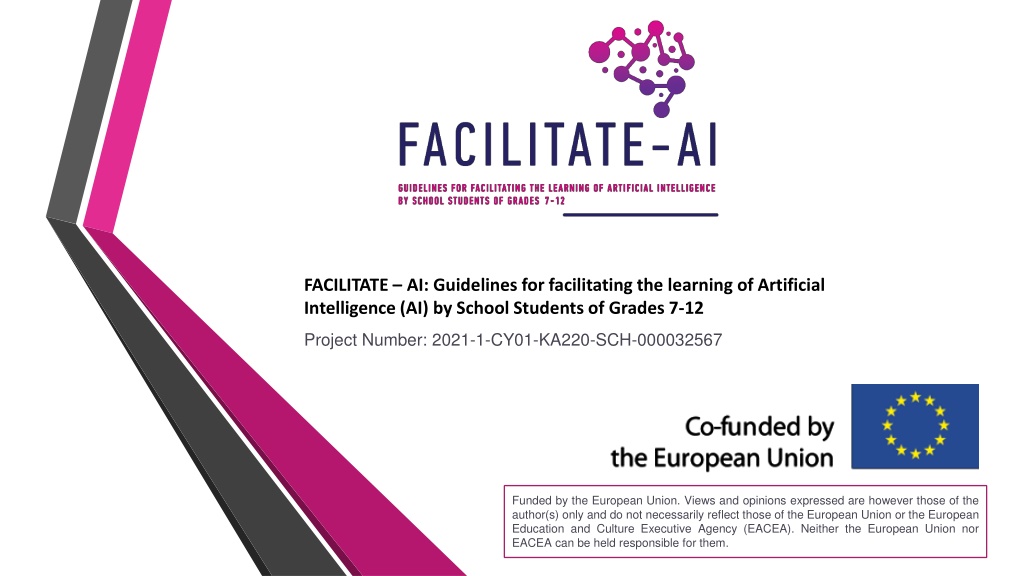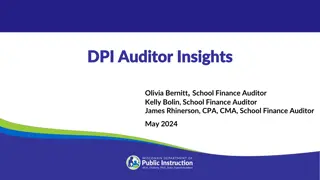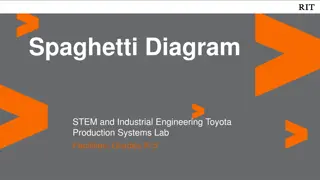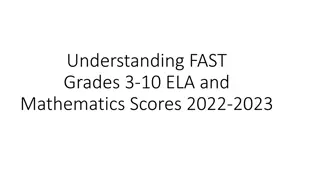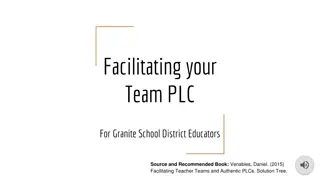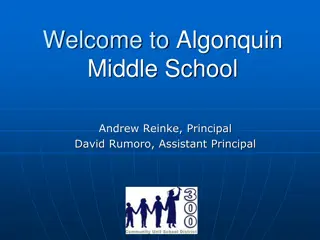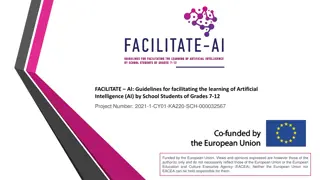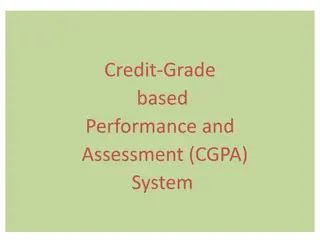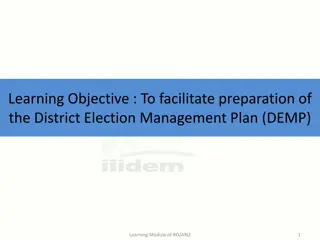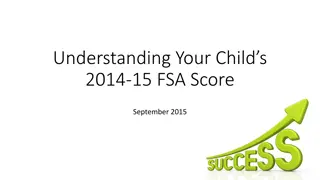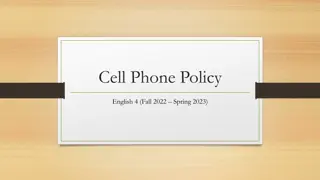Guidelines for Facilitating AI Learning in Grades 7-12
These guidelines focus on facilitating the learning of Artificial Intelligence by school students in Grades 7-12. The approach includes developing real-time feedback mechanisms, progress mechanics to motivate students, and gamification based on the Self-determination Theory. Emphasis is placed on intrinsic motivation over extrinsic motivation to enhance engagement in challenges, social interaction, and cooperation.
Download Presentation

Please find below an Image/Link to download the presentation.
The content on the website is provided AS IS for your information and personal use only. It may not be sold, licensed, or shared on other websites without obtaining consent from the author.If you encounter any issues during the download, it is possible that the publisher has removed the file from their server.
You are allowed to download the files provided on this website for personal or commercial use, subject to the condition that they are used lawfully. All files are the property of their respective owners.
The content on the website is provided AS IS for your information and personal use only. It may not be sold, licensed, or shared on other websites without obtaining consent from the author.
E N D
Presentation Transcript
FACILITATE AI: Guidelines for facilitating the learning of Artificial Intelligence (AI) by School Students of Grades 7-12 Project Number: 2021-1-CY01-KA220-SCH-000032567 This project has been funded with support from the European Commission. This PowerPoint reflects the views only of the author, and the Commission cannot be held responsible for any use which may be made of the information contained herein. Funded by the European Union. Views and opinions expressed are however those of the author(s) only and do not necessarily reflect those of the European Union or the European Education and Culture Executive Agency (EACEA). Neither the European Union nor EACEA can be held responsible for them.
Module 4.4 - Development of digital learning resources and support material Objectives Identify and/or develop real-time feedback mechanisms; Identify and/or develop progress mechanics that can motivate students to work autonomously and engaged. Project Number: 2021-1-CY01-KA220-SCH-000032567
Gamification Design Objectives In any gamification implementation, good planning is paramount Design gamification experience Mechanics Elements Frameworks define a powerful guidance for gamification implementation and guide user engagement Project Number: 2021-1-CY01-KA220-SCH-000032567
Gamification Design Objectives Self-determination Theory (SDT) Developed by Edward Deci and Richard Ryan People are not always motivated by rewards but by intrinsic motivation Intrinsic motivation doing an activity because you find it enjoyable Extrinsic motivation doing an activity because it leads to an outcome (e.g. reward, punishment, social approval, etc.) Extrinsic motivators can remove the intrinsic motivation Project Number: 2021-1-CY01-KA220-SCH-000032567
Gamification Design Objectives Gamification should should be based on the self-determination theory and attempt to focus on intrinsic motivation over extrinsic motivation Necessary to make sure that gamification elements bring a positive effect on engagement of learners in: Challenges and tasks Social interaction Sharing and cooperation Project Number: 2021-1-CY01-KA220-SCH-000032567
Gamification Design Objectives Mechanics Setup, rules and progression MDE model for gamified experience Emotions Player s State of Mind Dynamics Player Behaviour Adapted from: Robson et al., 2015 K. Robson, K. Plangger, J.H. Kietzmann, I. McCarthy, L. Pitt Is it all a game? Understanding the principles of gamification Business Horizons, 58 (4) (2015), pp. 411-420 Project Number: 2021-1-CY01-KA220-SCH-000032567
Gamification Design Objectives MDE framework, with the emotion's component extended to include cognition Source: Mullins, J. K., & Sabherwal, R. (2020). Gamification: A cognitive-emotional view. Journal of Business Research, 106, 304-314. Project Number: 2021-1-CY01-KA220-SCH-000032567
User Engagement Remember not all users Learn with the same pace Explore and experiment Cooperate with others Socialize and interact with others Source: https://matthewbarr.co.uk/bartle/ Need to detect and modify game mechanics where necessary for learning objectives Project Number: 2021-1-CY01-KA220-SCH-000032567
User Engagement Source: Costa, C. J., Aparicio, M., Aparicio, S., & Aparicio, J. T. (2017, August). Gamification usage ecology. In Proceedings of the 35th ACM International Conference on the Design of Communication (pp. 1-9). Project Number: 2021-1-CY01-KA220-SCH-000032567
Gamification Analytics Student Interationwith resources Teacher Monitor student interactions with resources Monitor student interactions with gamification elements Design interaction objectives Teacher Design gamification mechanincs Implement gamification dynamics Teacher Adapt Gamification Design New gamification elements Adapted from: Tenorio, K., Dermeval, D., Monteiro, M., Peixoto, A., and Pedro, A. (2020). Raising Teachers Empowerment in Gamification Design of Adaptive Learning Systems: A Qualitative Research. pages 524 536. Springer, Cham Project Number: 2021-1-CY01-KA220-SCH-000032567
Gamification Analytics Game Elements Analytics Point Distributions Temporal Statistics User Distribution on Game Element State Feedback Rate User Characteristics User Logs Project Number: 2021-1-CY01-KA220-SCH-000032567
Gamification Analytics Define Gamification Application KPI Monitoring Custom KPIs based on task/activity Patterns Based KPIs based on task/activity Objective Markers Dashboards Project Number: 2021-1-CY01-KA220-SCH-000032567
Moodle Demo Explore gamification analytics with Moodle LMS with the following plugins Level XP Stash Project Number: 2021-1-CY01-KA220-SCH-000032567
Kaggle Demo Explore gamification analytics with Kaggle LeaderBoards User Scoring Submissions dynamics Feedback Public and Private Project Number: 2021-1-CY01-KA220-SCH-000032567
FACILITATE AI Partners Project Number: 2021-1-CY01-KA220-SCH-000032567
